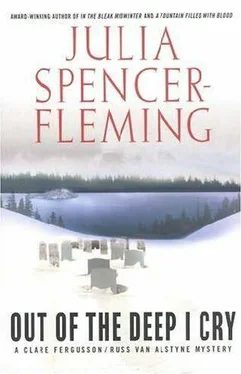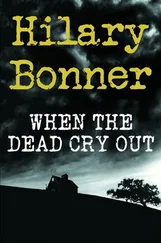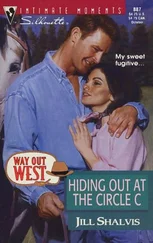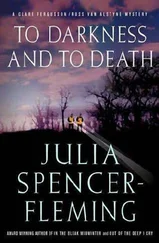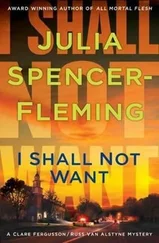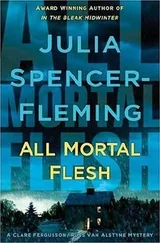Norm Madsen leaned forward. “So is this Jonathon Ketchem’s body?”
Dr. Dvorak spread his hands. “That’s what the evidence suggests.”
“The body was found inside the remains of an old car,” Russ said. “We had the divers bring up several pieces, but at this point, all we can say for sure is that it was some sort of old Ford.”
“My father drove a Ford. That’s what he was in when he went missing.”
“I know. It’s in the original report. Problem is, something like sixty percent of the cars sold in the county back then were Fords, according to Lee Harse over to Fort Henry Ford.” Russ looked at the rest of them, looking at him. “Well, I don’t know anything about old cars. The state crime lab has the recovered pieces and we’ve faxed their photos over to an expert Harse recommended. So hopefully, we’ll be able to identify the exact model and year soon.”
“But till then we don’t know?” Mrs. Marshall twisted her fine-boned hands together, and Clare, from her vantage point near the door, was reminded of the long, elegant finger bones tangled in the divers’ net.
Russ leaned forward, bracing one arm against Dr. Dvorak’s desk. “Mrs. Marshall, the doctor here is going to tell you we can’t really be sure. But I’ll tell you what my gut says. There’s no other missing person I know of who fits the bill. Now, I’ve put the info we have out on the wire. And maybe I’ll get a report back from the Albany PD that they have a seventy-year-old unsolved missing-persons case, and their man has broken fingers and eight fillings and drove a Ford. But I don’t think that’s going to happen. I believe we’ve found the body of your father, Jonathon Ketchem.”
Mrs. Marshall stiffened. After a moment she said, “How did he die?”
Russ looked to Dr. Dvorak.
“Did he drown? Was he shot?”
“If he was shot, there’s no surviving evidence of it,” Dvorak said. “I doubt, even if we had tissue to work with, that we’d find he’d been drowned.” He glanced at Russ.
“What is it?” Mrs. Marshall was pale, composed but on the edge.
“It appears that the proximate cause of death was a blow to the back of the skull. Several blows.” Dr. Dvorak paused for a moment, as if waiting for another question. When none was forthcoming, he went on. “From the extent of the damage, the cross-cranial impact zone, and the angle of declivity, I’ve concluded he was struck by a heavy, probably flat object with a surface area of at least eight to ten inches.”
Mrs. Marshall looked at the pathologist. She turned to Norm Madsen, then to Russ. “I don’t understand,” she said finally. “What sort of weapon could that be?”
There was a silence. Clare wracked her brain for some idea. Tire iron… baseball bat… none of those were flat. “A frying pan,” Russ said finally. “It has to be. Jonathon Ketchem was beaten to death with a frying pan.”
THEN
Saturday, March 29, 1930
Is she asleep?”
Jane paused at the door to the kitchen. Jon hadn’t lifted his head from the paper to ask the question. “Yes,” she said. “She was all tired out from playing with the Reid boys today.”
He grunted. She crossed to the sink and pumped more water into the basin before lifting her apron off its nail and pulling it over her head. She knotted it behind her and attacked the dinner dishes. She was all tired out as well, after walking Solace to and from the Reids, and doing the marketing, and seeing to the chickens and the house and three meals and a triple batch of cookies intended for St. Alban’s bake sale tomorrow. As near as she could tell, Jon hadn’t moved from the davenport all day, except to go out back to the necessary. She scooped through the basin and dragged up a couple forks. All day. More like all week. He hadn’t been out of the house since Monday. She was the one who had brought him in the newspaper. The only reason he was in the kitchen right now was because the night was bidding cold, and the kitchen, with its woodstove, was the warmest spot in the house. He hadn’t gone down cellar to shovel more coal into the furnace, and she’d be deviled if she was going to do it for him. As it was, she was going to have to step out to the woodpile on the back porch and chop kindling for tomorrow morning.
“You lookin’ at the help-wanted notices?” She knew he wasn’t.
He grunted again.
“Lula Reid was saying that Will has openings for a strong man on his crew. He needs reliable workers. He’d love to have a farmer like you, she said. Used to rising early and putting in a full day. The pay’s real good.”
He dropped the paper on the oilcloth-covered table. “You some sort of job broker now?”
She wiped one of her grandmother’s blue willow plates dry and laid it on the counter. “Somebody’s got to be. You haven’t worked since February.” She turned toward him, leaning against the sink. “You’ve got to find something, Jon. Why not work for Will’s crew? At least it’d bring some money in.”
He looked up at her from his chair. “Ketchems are farmers. We don’t break rocks and pour asphalt so’s rich men can drive up to the mountains without bumping their asses along the way.”
“Jonathon Ketchem, I won’t have that kind of language in my house!”
“Don’t pester me and you won’t have to hear it.” He went back to his paper. She looked at him for a moment. He was still handsome, with his thick dark hair falling over his forehead and his dark eyes. Solace favored him. When they had made her, lying together in their marriage bed, had she loved him? One edge of his newspaper half fell over a painted iron trivet he had won for her, at a shooting gallery at the Sacandaga Amusement Park. He had been home on leave, full of stories about New York City and the South, looking like a million dollars in his uniform. Hadn’t she loved him then?
She turned back to her dishes. She rested her reddened hands on the curved white edge of the sink and looked at her wedding band. He had wrestled it onto her finger in Justice Kendrick’s parlor, with Mrs. Kendrick pumping out “Abide with Me” on their little organ and her best friend, Patsy, giggling with his brother David. She must have loved him then. She wished she could feel it now, feel something to go with the memories, instead of this blank incredulity that sent her searching for evidence that yes, once upon a time, she had loved the intimate stranger at her kitchen table.
“The dam’s finished up,” he said.
She was surprised he spoke. “I’d heard.”
“Two days now, it’s been filling up. Soon, it’ll all be gone.” The tone in his voice made her turn around. “The hayfield. The beanfield. Lord, I used to love that field in the spring, all the flowers peeping out. I wonder if the water rushes in fast or rises slow.” He looked into some middle distance that only he could see. “I wonder if people’s stuff comes floating by. You know, stuff that got left behind, not worth taking.”
She turned back to the sink and grabbed another blue willow plate. “Anything in people’s houses or barns got burnt down. You know that.”
“Our barn could be knee deep in water right now.”
“There’s no barn left.”
“Remember how the boys used to swing from that rope I hung on the cross-beam? Imagine ’em swinging back and forth and then letting go into the water.”
She whirled, water splattering from the plate in her hand. “Don’t talk about that! There isn’t any barn there anymore!”
His eyes were spooky-empty, looking at things he had no business looking at. “A ghost barn,” he said. “For ghost children.” His voice broke on the last word.
Читать дальше
